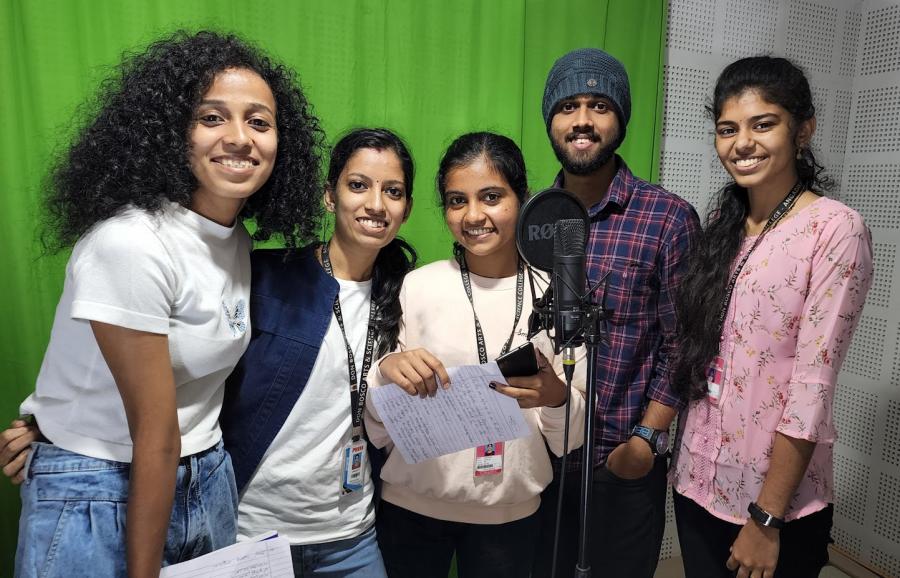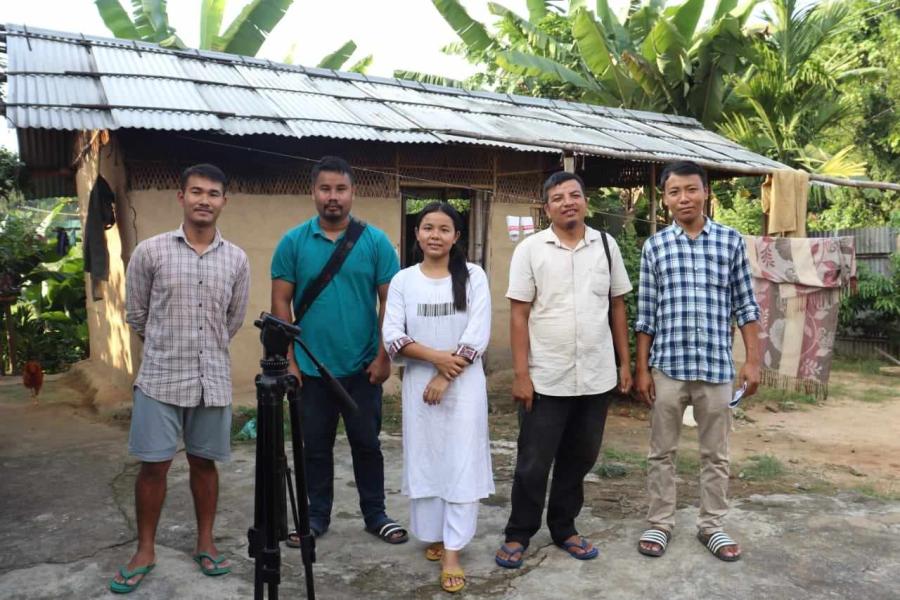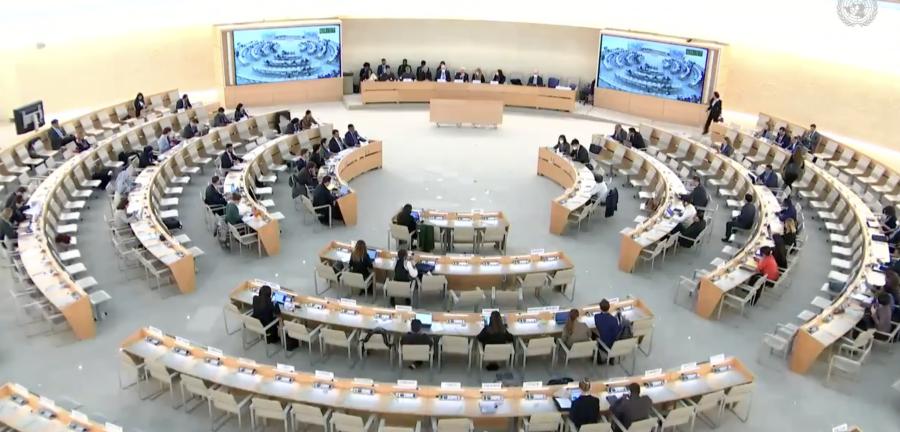
By Rucha Chitnis
On a precipitous mountain slope in Laitsohpliah, a woman from the matrilineal Khasi tribe grasped finger millet in her hands, a cereal cultivated in India for over 2000 years that is teeming with calcium and protein. We were in Meghalaya, a state in Northeast India famed for its stunning biodiversity, dizzying mountainous vistas and a beguiling name that means the abode of clouds. The visit to the village was part of the Indigenous Terra Madre (ITM) gathering to showcase the profound agrobiodiversity and lively culture that is created and preserved by Indigenous Peoples around the world.
Over 600 delegates from 58 countries converged in Meghalaya on November 3-7, 2015 to celebrate the ancient food systems, vast traditional knowledge and biocultural diversity of Indigenous Peoples. International Terra Madre, also called International Mei-Ramew, meaning Mother Earth in the local Khasi language, is a collaboration of the Indigenous Partnership for Agrobiodiversity and Food Sovereignty, Slow Food International and North East Slow Food and Agrobiodiversity Society (NESFAS).
“We need to trust in our wisdom,” said Phrang Roy, founder of NESFAS and a visionary Khasi advocate, who brought ITM to his homeland in the hills of Shillong. “What we wanted to combine is not just the question of taste, but that taste is the reflection of biodiversity. If we don’t have forests around our villages, our diets and our food won’t be there.” The five-day event included a conference, visits to nine Indigenous host villages and concluded with a spirited food festival that exhibited the flavors of Indigenous food cultures across Northeast India and beyond.
“Our food is pre-colonial, it is pre-GMO. It is ancient food, and ancient seeds. It is a food that is part of our soul and our spirit,” said Winona LaDuke, Anishinaabe activist, at the opening ceremony. In the face of climate challenges and land grabs, LaDuke talked about the resiliency of Indigenous food systems and the sacred connection Native Americans have with their foodways.
Dayamani Barla of the Munda tribe in Jharkhand, India, concurred. Barla has witnessed how land grabs and displacement of Indigenous peoples in Jharkhand have devastated their food security, culture and identity. Barla also led a long brave resistance that stopped the world’s largest steel company Arcellor-Mittal from displacing thousands of Indigenous peoples and farmers. Loha nahi anaj chahiye! (“We want grains, not iron!”) was the rallying cry of Indigenous communities protesting the corporation’s project. In 2013, she was awarded the first Ellen L. Lutz Indigenous Rights Award by Cultural Survival for her courageous resistance in the face of the ugly power of corporate might.
At the ITM convening, Barla emphasized that the current economic paradigm was leading the planet to catastrophic climate change and eroding Indigenous rights. “If we are talking about strengthening food systems, we need to stop the displacement of Indigenous peoples,” said Barla. “Indigenous Peoples can’t imagine a future where nature is violated. We can’t realize food sovereignty when our lands, forests and waterways are being destroyed. If we want to sustain life on this planet, all people and social movements need to unite with the resistance of Indigenous peoples.”
One of the highlights of the convening were taste workshops to showcase the incredible diversity of Indigenous food systems that are vital for their resiliency and survival. At an insect tasting workshop, delegates learned that there are over 1900 species of edible insects on Earth; insects are an important source of nutrition for Indigenous communities in many parts of the world, offering protein, fiber and good fats. First on the tasting menu was a delicious, spicy chutney of weaver ants that was prepared by women from the Siddi community in Karnataka in Southern India. The chutney was brought by Sunita Rao, founder of Vanastree, a seed saving collective of women, who tend to their food gardens in the forests of the majestic Western Ghats, a biodiversity hotspot in India. The Siddis arrived in India centuries ago as slaves by the Portuguese. “Insects are delicious and have a flavor,” said Sunita, nudging the delegates to taste with an open mind. Delegates also munched on carpenter worms, spiders and grasshoppers.
Cultural Survival’s Indigenous community radio partners from Nepal, Dev Kumar Sunuwar and Jagatman Dong, also joined the ITM convening. They shared it was crucial for Indigenous peoples to frame their own narratives to highlight and preserve their food cultures. Dev and Jagat are about to launch the very first Indigenous television programming in Nepal, where they hope to have cooking shows on traditional foods. “Earlier there was a lot of shame to reveal one’s Indigenous identity. Now that we have produced our community radio shows in eight Indigenous languages, people are slowly starting to have a sense of pride,” shared Dong.
Slow Food International founder, Carlo Petrini, gave a passionate talk that likened the industrial global food system to a criminal system. “We need to change this paradigm…we risk losing our history and our food heritage.” As a stunning counter to the monoculture paradigm, ITM organized a food festival of prodigious size that exhibited an astonishing array of Indigenous foods—roots, tubers, greens, corns, millets, paddy, drinks, sweets, pickles and hot foods. A dazzling performance of dances and songs followed, and the crowd was thrilled to hear Ko Meiramew, the theme song of ITM that was sung in exquisite harmony by Indigenous musicians from Meghalaya.
What made the food festival especially enchanting was a sacred grove at the periphery that wove a stunning, lush tapestry. We walked in contemplation and silence through the verdant ancient forest. Recollecting the walk through the sacred forest, Barla remarked: “Mother Earth gives us so much. I saw a fallen tree that was birthing new life, life that was already taking on the avatar of the forest. Indigenous peoples always talk about community and collective rights. We know our survival is bound with the survival of nature.”
All photos by Rucha Chitnis.
-Rucha Chitnis is a photojournalist and writer, who is founder of Changing the Narrative, a storytelling project that highlights the dignity, agency and power of women and grassroots movements. Follow her on Twitter: @ruchachitnis
Listen to Indigenous Rights Radio Programs made at Terra Madre here.








